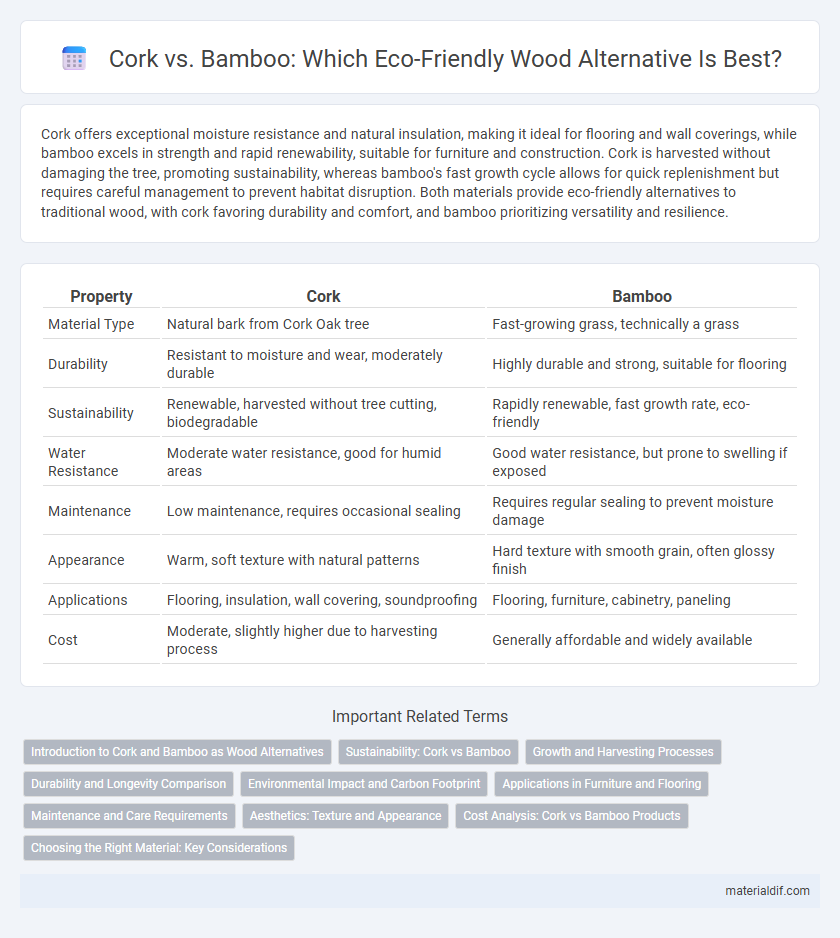Cork offers exceptional moisture resistance and natural insulation, making it ideal for flooring and wall coverings, while bamboo excels in strength and rapid renewability, suitable for furniture and construction. Cork is harvested without damaging the tree, promoting sustainability, whereas bamboo's fast growth cycle allows for quick replenishment but requires careful management to prevent habitat disruption. Both materials provide eco-friendly alternatives to traditional wood, with cork favoring durability and comfort, and bamboo prioritizing versatility and resilience.
Table of Comparison
| Property | Cork | Bamboo |
|---|---|---|
| Material Type | Natural bark from Cork Oak tree | Fast-growing grass, technically a grass |
| Durability | Resistant to moisture and wear, moderately durable | Highly durable and strong, suitable for flooring |
| Sustainability | Renewable, harvested without tree cutting, biodegradable | Rapidly renewable, fast growth rate, eco-friendly |
| Water Resistance | Moderate water resistance, good for humid areas | Good water resistance, but prone to swelling if exposed |
| Maintenance | Low maintenance, requires occasional sealing | Requires regular sealing to prevent moisture damage |
| Appearance | Warm, soft texture with natural patterns | Hard texture with smooth grain, often glossy finish |
| Applications | Flooring, insulation, wall covering, soundproofing | Flooring, furniture, cabinetry, paneling |
| Cost | Moderate, slightly higher due to harvesting process | Generally affordable and widely available |
Introduction to Cork and Bamboo as Wood Alternatives
Cork and bamboo are sustainable wood alternatives prized for their rapid renewability and eco-friendly harvesting methods. Cork originates from the bark of the cork oak tree, regenerating naturally without tree felling, while bamboo is a fast-growing grass that reaches maturity in three to five years. Both materials offer versatile applications in flooring, furniture, and design, providing durable, lightweight, and moisture-resistant solutions compared to traditional hardwood.
Sustainability: Cork vs Bamboo
Cork is highly sustainable due to its renewable harvesting process that preserves tree health, with cork oak trees capable of producing bark for over 200 years without being cut down. Bamboo grows rapidly, typically reaching maturity within five years, making it a fast-regenerating resource that sequesters large amounts of carbon. Both materials offer eco-friendly alternatives to traditional woods, with cork excelling in durability and minimal environmental impact, while bamboo provides rapid renewability and high carbon absorption.
Growth and Harvesting Processes
Cork is harvested from the bark of the cork oak tree, which regenerates its bark every 9 to 12 years, allowing sustainable and renewable production without cutting down the tree. Bamboo grows rapidly, reaching maturity in 3 to 5 years, and can be harvested by cutting the stalks at the base without damaging the root system, enabling continuous regrowth. Both cork and bamboo offer eco-friendly alternatives due to their fast regeneration rates and minimal environmental impact during harvesting.
Durability and Longevity Comparison
Cork offers exceptional resilience with its natural elasticity and high resistance to wear, maintaining durability for over 30 years in flooring applications. Bamboo exhibits superior hardness and tensile strength, often lasting 25 to 50 years depending on treatment and environmental conditions. Both materials resist moisture and pests, but cork's ability to compress and rebound gives it enhanced longevity in high-traffic areas compared to bamboo's susceptibility to scratches over time.
Environmental Impact and Carbon Footprint
Cork harvesting promotes forest biodiversity and regenerates naturally without tree felling, resulting in a low carbon footprint and sustainable resource management. Bamboo grows rapidly, sequesters large amounts of CO2, and requires minimal pesticides, yet some cultivation practices may cause soil depletion and habitat loss, impacting its overall environmental footprint. Both materials offer eco-friendly alternatives to traditional timber, with cork excelling in renewability and bamboo in carbon absorption efficiency.
Applications in Furniture and Flooring
Cork offers exceptional cushioning and thermal insulation, making it ideal for flooring in living spaces and underfoot comfort in furniture applications. Bamboo provides superior strength and durability, often used in modern furniture designs and high-traffic flooring due to its resistance to wear and moisture. Both materials promote sustainable choices, with cork's renewable bark harvesting and bamboo's rapid growth rate contributing to eco-friendly furniture and flooring solutions.
Maintenance and Care Requirements
Cork requires minimal maintenance due to its natural resistance to moisture, mold, and mildew, making it ideal for humid environments. Bamboo demands regular sealing and cleaning to prevent water damage and maintain its durability, especially in high-traffic areas. Both materials benefit from gentle cleaning solutions and avoidance of excessive moisture to prolong their lifespan.
Aesthetics: Texture and Appearance
Cork offers a unique, natural texture with a warm, speckled appearance that adds rustic charm and softness to interiors. Bamboo features a smooth, sleek surface with a uniform grain and light color, providing a modern, clean aesthetic suitable for minimalist designs. Both materials offer distinct visual appeal, with cork emphasizing organic warmth and bamboo highlighting contemporary elegance.
Cost Analysis: Cork vs Bamboo Products
Cork products generally have a higher upfront cost due to their labor-intensive harvesting process and natural sustainability features, often priced between $4 to $7 per square foot. Bamboo offers a more affordable alternative, with prices ranging from $2 to $5 per square foot, benefiting from rapid growth rates and efficient manufacturing. Long-term cost analysis shows cork's durability and resistance to moisture may reduce replacement frequency, while bamboo's lower price and eco-friendly appeal make it a cost-effective option for budget-conscious consumers.
Choosing the Right Material: Key Considerations
Cork offers exceptional water resistance and natural insulation, making it ideal for flooring in humid environments, while bamboo provides superior strength and rapid renewability, suited for sustainable furniture and construction. Durability varies as cork is softer but highly resilient to compression, whereas bamboo's hardness supports heavy-use applications. Environmental impact favors bamboo due to its faster growth cycle and carbon sequestration capabilities, but cork's eco-friendly harvesting process also reduces deforestation.
Cork vs Bamboo Infographic

 materialdif.com
materialdif.com